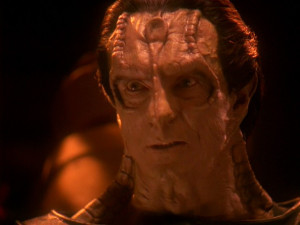
If you ask people who the greatest villain in all of Star Trek is, most of them will tell you it’s Khan Noonien Singh, probably shouting his name in hammy, Shatnerian fashion. But if you want to know my opinion, Khan was always kind of overrated. Not a bad villain exactly, but very single-minded, focused almost completely on revenge (and quoting Melville). Next, they’ll tell you it’s the Borg, who were scary for awhile, particularly in the gripping “Best of Both Worlds” arc, but thereafter had their coolness diminished by their transformation from an unstoppable virus of the galaxy into space bees who could be made cute and cuddly through separation from the Collective. It didn’t help that Voyager was eventually able to blow up Borg Cubes left and right when just one was originally capable of smashing most of the Federation. But for all this, there is one villain in Star Trek who managed to be complex, scary, unpredictable, and never lose his power to stand against the heroes, and that is Gul Dukat of the Cardassian Order.
Gul Dukat was the former head of Terok Nor, the space station from which the fascist Cardassians ruled the spiritual Bajoran people. After the Cardassians ceded control of Bajor in a deal with the Federation, the station was handed over (becoming Deep Space Nine), but Dukat’s presence remained. He continued to serve as a diplomatic presence on the station, sometimes as an ally to Commander Sisko and Major Kira, other times as their enemy. He was a skilled military commander and strategist, very proud, charismatic, and passionate, and occasionally willing to buck his own superiors in favor of what he saw as the right thing. For all this, however, Dukat committed many war crimes against the Bajorans during his tenure at the station, actions he mostly considered justified because he did his best to keep those crimes from being even worse. He also has a narcissistic need to be respected and understood by his enemies, perhaps to absolve himself of the guilt he feels for his misdeeds.
Throughout the course of Star Trek: Deep Space Nine, Dukat is one of the most dynamic characters. Without contradicting himself in the slightest at any point, Dukat is at varying points a loyal Cardassian soldier, a hot-headed maverick, a ruthless politician, an ally to the Federation, a noble freedom fighter, an agent of the Dominion, a loving father, a tyrant, a pitiable madman, a vicious nihilist, and finally the leader of a depraved cult. It sounds almost like a parody, but in truth, Dukat is simply a man who sees himself as the hero of his own story, and in his story, he does what he has to do. From his perspective, this means that if he must commit evil in the name of what he sees as right, he will do it. If he has to serve powerful leaders, he will do it. If he must then betray those leaders, he will do it. If he must find new masters and turn his people over to them, he will do it. If he must then betray those masters to seek revenge against those whom he hates, he will do it. Dukat is compelling because, from one moment to the next, you never know what he’s going to do. There are plenty of times when he appears noble and heroic. He seems repentant for the sins of his past and is eager to make up for them, and he’s perfectly sincere. Then he turns around and does something so evil it beggars belief, and justifies his behavior with the idea that it was the only way.
Gul Dukat is a great villain because he is amazingly complex. He doesn’t set out to be evil, and he doesn’t see himself as the villain of the story. Quite the opposite, in fact. He doesn’t see himself as any different from Sisko or Kira or any of the others. They do what they have to in order to preserve their worlds and societies, and so, he reckons, does he. In fact, he holds himself as more heroic, because he’s willing to make the impossible decisions lesser men never could. People may hate him in the moment, Dukat believes, but in the end, they will thank him. Unfortunately, what he fails to realize is that his actions are mostly those of destruction and betrayal, and however noble his intentions, he leaves nothing but death and oppression in his wake.
